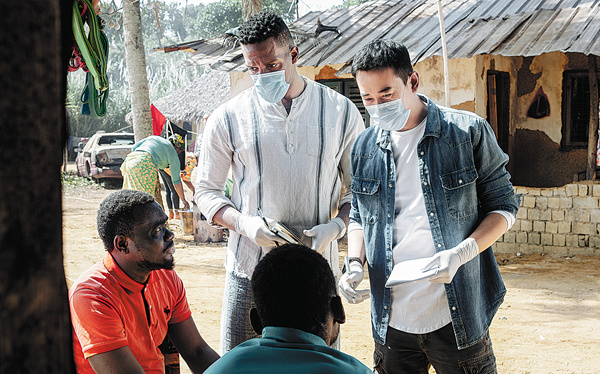

Yang says he also dived into the"58-year history of China's aid to Africa" and heard touching stories that gave him further inspiration for the series. A Chinese surgeon was too exhausted to feel the pain when sewing the needle into one of his fingers after performing several operations without a break; and a pediatrician once volunteered to play a motherlike role, holding a terrified child tightly in her arms, singing a song to ease the little patient's tension after he saw an adult patient pass away in the ward.
Aside from the major plotline unfolding, with actor Luo Jin starring as Zheng, in which the Chinese doctor endeavors to investigate the first infection in a local village, the series also develops a parallel plot about an overseas Chinese journalist, played by actress Mao Xiaotong, venturing into the village, disguised as an international doctor, to investigate a diamond-smuggling racket.
Such a design was made to add dramatic elements and draw a wider viewership, Yang says, adding that the two protagonists share a similarity. "They both wish to help the locals and seek truth despite facing hardships and hazards."
With major scenes set in Africa, the crew recruited more than 100 African people, living in Guangdong and Hainan provinces at the time of shooting, to appear in the series.
The original storyline was also changed to fit a cameo by the teenage daughter of an extra actor from Africa.
The girl was visiting her father during the shooting when Yang noticed her dynamic personality and Mandarin-speaking ability, and got her to act.
"I suddenly had a thought that if we could have a role like her, the series might be better. After I discussed with the producer and scriptwriter, we adjusted the script and invited her to act as the daughter of Gassimou (the character), as such a role would fit the emotional gap left by the death of Gassimou," says Yang.
To consolidate the realistic effect, the crew also constructed two replicas of P3 and P4 laboratories, the second-highest and the highest biosafety levels to protect researchers from dangerous viruses, and a mobile medical vehicle in a sound-stage covering an area of 2,400 square meters.
But audiences who have learned a lot about contagious diseases since COVID-19 might be surprised to see that many medical workers are not wearing face masks or wrapped in protective suits throughout the series.
Yang says it is because most African countries face a shortage of medical equipment and facilities, as well as the fact that Ebola is transmitted through direct contact with blood or body fluids, so such details in the series are convincing.
Moreover, the series is not about COVID-19.
For Luo, a veteran actor with nearly 21 million fans on Chinese micro-blogging platform Sina Weibo, acting as the fearless and devoted doctor Zheng was a meaningful experience as both his parents previously worked at a hospital.
"I spent a lot of time to learn about Ebola and how Chinese doctors lived and worked during their mission to help Ebola-hit African countries," says Luo.
"I believe it's not just about how Chinese helped Africans-we have also received a lot of assistance from our African brothers."